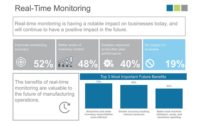How Quality Helps Customers Soar Applying Real-World Best Practices in Aerospace Quality
In the aerospace industry, lives are at risk if a product doesn’t adhere to the processes and procedures we have in place.

Increasingly complex customer and regulatory compliance requirements, tighter time-to-market schedules from customers who want greater product customization, and the constant pressure on costs and pricing make aerospace manufacturing one of the most challenging businesses in the world to compete in. As a result, it takes a focused intensity and intelligence that drives continual improvement to accept the challenges of excelling at compliance and quality in this sector. Companies that want to compete and win in aerospace manufacturing must develop a set of skills that become a core part of their DNA and are standardized into best practices.
No company understands the challenges better than R.E. Darling, where a continual commitment to driving innovation while excelling at quality has fueled 70 years of steady, continuous growth, opening up new markets and opportunities to attract and grow its customers. Starting in 1948 with aviators’ breathing oxygen tubes, the company has progressively grown to provide specialty rubber and composite products primarily used in the aerospace and defense industry—with a specialization in customized hose and cable design, including material development and connectors, configured to meet exacting requirements of its customers.
An extensive corporate-wide commitment to quality at R.E. Darling has led to NASA selecting the company to provide life support hoses for the Mercury, Gemini, Apollo, and Space Shuttle flights. Today R.E. Darling’s hoses are visible in the FREEDOM 7 and Gemini 4 spacecraft on display in the main lobby of the Smithsonian National Air and Space Museum. This article examines the organizational structure, processes and technologies that the company has implemented to gain the loyalty and trust of customers such as NASA. New and established aerospace manufacturers alike can apply these practices in order to grow their business and revenues as trusted industry providers.
Making Quality Core to Corporate Identity
The key to generating intense customer loyalty begins by combining innovative engineering and problem-solving that is focused on delivering the highest quality products and services possible. This is challenging for any business to accomplish, and for companies such as R.E. Darling, committed to 100% product customization and build-to-order (BTO), it’s especially difficult. That is why it is critical for manufacturers to set a solid foundation of communication and collaboration throughout their plants.
To start, executives should identify specific areas in the company that are being targeted for performance and quality excellence. Ideally, each of the targeted categories will have a leadership team that is comprised of employees from various departments within the company. At R.E. Darling, this approach has brought a diversity in knowledge and perspectives to allow for a broader view. At the same time, projecting and instilling the proper quality culture to all employees, from the top-level positions down, helps to create uniformity and a similar mindset throughout the organization as it pertains to company goals in all areas.
Also central to the effort is relying on an agile production environment and daily standup meetings to review the progress on special projects and orders, including customer orders in process and about to be received. Key team members at the daily standup meetings should include experts in industry compliance, exports compliance, contracts, production scheduling, quality management, and services, along with senior management. This fosters vigilance in identifying what’s working internally and what areas need to improve.
Additional topics covered in the daily standups may include a company’s progress toward achieving industry validation for quality practices. At R.E. Darling, one ongoing topic is finalization of AS9100 Rev. C and D certifications, since AS 9100 encapsulates ISO 9001 requirements to suit the quality system needs of the aerospace and defense industry more effectively than the general ISO 9100 standard. Another focus is the company’s work toward earning the Malcolm Baldrige Performance Excellence Award.
Five Strategies for Optimizing Quality Practices
Beyond corporate culture and collaboration, aerospace manufacturers need to ensure that quality is built into the DNA of their organizations, turning it into a strong competitive differentiator. To this end, R.E. Darling has implemented five strategies that other companies can apply in optimizing quality throughout their operations.
Turn audits and documentation into a strength. Frequent business procedure audits empower companies to learn about how operations are excelling today and what needs to improve. In the aerospace industry, lives are at risk if a product doesn’t adhere to the processes and procedures we have in place. Ongoing audits help to ensure that there is no deviation from the documented process and the way items are manufactured. At the same time, the strength of audit is only as strong as the documentation supporting it. Within R.E. Darling, there is wide recognition that the greatest product quality comes when all business systems, procedures and processes are well-documented and followed. Additionally, processes and procedures should be detailed and clear enough to not require employee interpretation, and as changes to systems, procedures and processes are completed and approved, the company needs to distribute documents and train employees in a timely manner.
Concentrate on the quality metrics that mean the most to customers. Manufacturers often have the systems and engineering prowess to create compliance and quality management dashboards populated with dozens of key performance indicators (KPIs) and metrics. However, companies will be more effective if they prioritize on the quality metrics that customers care about most and work to improve them daily with high-intensity focus. At R.E. Darling, three metrics have emerged as top priorities: on-time delivery, customer returns, and customer satisfaction—measured by product quality, communications, and return merchandise authorization (RMA) percentages. The company also tracks cycle counts from its maintenance, repair and operating supply (MRO) system.
Centralize contracts and export compliance in a single department. Many aerospace companies regularly conduct business with government agencies; defense departments and ministries; and aerospace, aircraft, and defense contractors in the U.S. and any number of foreign nations. Therefore, regardless of company size, manufacturers should consider it a must-have to centralize contracts and export compliance in a single department with deep expertise in Federal Acquisition Regulation (FAR), Defense Federal Acquisition Regulation (DFAR), and export requirements. Completing the required paperwork to sell to these agencies domestically and abroad is a time-consuming task that requires deep expertise. At R.E. Darling, this centralized, specialized team also has purchase order provisions (POPs) based on each item a customer can order in addition to having terms and conditions in place. This team also ensures that required export license agreements are in place and the proper automated export system (AES) filing is completed.
Look for opportunities to automate contract and export compliance processes. Automation not only streamlines processes associated with contracts and export compliance, it also helps to protect against costly errors. For example, R.E. Darling uses a template-based automated contract review process and workflow that has associated tasks, standard durations for those tasks, and responsible parties assigned to the tasks, helping contract approval to be more regimented and flow smoothly. R.E. Darling also has the ability within its ERP system to identify and flag customers and items where export documents, commercial invoices and additional information are required—such as Schedule B Number, United States Munitions List (USML) Category, and Export Control Classification Number (ECCN)—saving time especially during preparation for shipping. Additionally, required forms and contracts can be easily generated from within the R.E. Darling ERP system, and automated reports and alerts create awareness of export-controlled items that will be shipping shortly, further enabling greater efficiency, collaboration and communication across the company.
Implement a comprehensive supplier quality program. In the aerospace industry, success depends on how much a company can be counted on to deliver excellent products daily, which are often based on components and materials from multiple suppliers. At R.E. Darling, this has led to a three-prong approach. First, it requires all suppliers directly supporting production to maintain a 97% on-time delivery rating and a 97% quality rating (first pass yield). Second, the company relies on a rigorous process to qualify vendors, and both the quality and purchasing departments must both approve new vendors. Criteria in every potential supplier onboarding include trade references, financial stability, how long the company has been in business, and supplier quality self-rating. This last metric incorporates percentage of shipments on time within the last six months, percentage of shipments returned or found to be discrepant in last six months, certifications, quality system the supplier complies with, who a company is currently approved to do work for, current on-time delivery rating, and current quality rating. Third, to ensure consistent quality, R.E. Darling has a customized supplier management quality system based on quality performance analysis that is customized to reflect supplier delivery performance, quantity, pricing and trending of product quality.
By applying best practices implemented at R.E. Darling and building the DNA for continual improvement into the organization, aerospace manufacturers will be well positioned to intense customer loyalty by providing the highest quality products and services when they are needed.
Looking for a reprint of this article?
From high-res PDFs to custom plaques, order your copy today!






